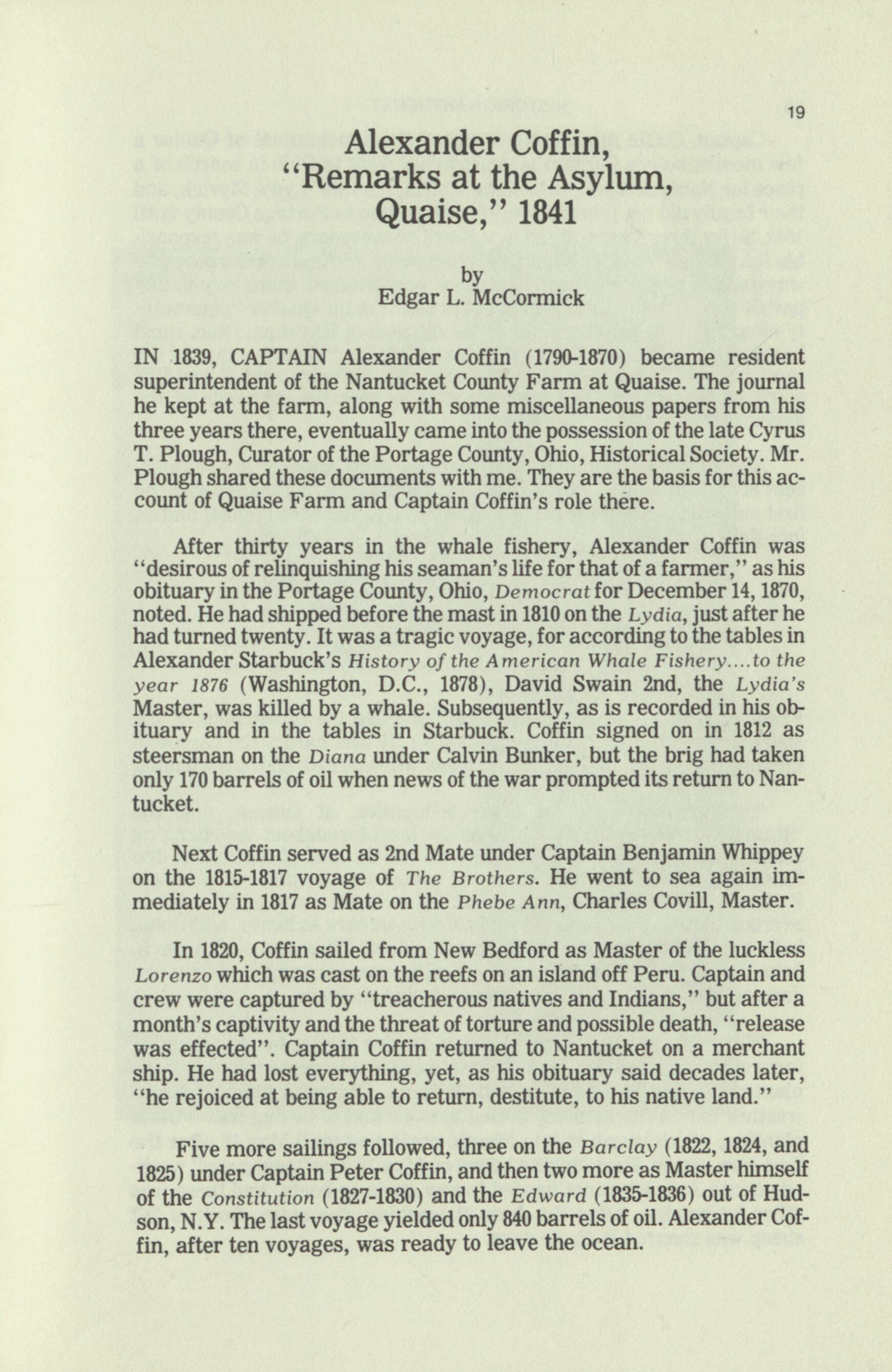
13 minute read
by Edgar L. McCormick
by Edgar L. McCormick
19
IN 1839, CAPTAIN Alexander Coffin (1790-1870) became resident superintendent of the Nantucket County Farm at Quaise. The journal he kept at the farm, along with some miscellaneous papers from his three years there, eventually came into the possession of the late Cyrus T. Plough, Curator of the Portage County, Ohio, Historical Society. Mr. Plough shared these documents with me. They are the basis for this account of Quaise Farm and Captain Coffin's role there.
After thirty years in the whale fishery, Alexander Coffin was "desirous of relinquishing his seaman's life for that of a farmer," as his obituary in the Portage County, Ohio, Democrat for December 14,1870, noted. He had shipped before the mast in 1810 on the Lydia, just after he had turned twenty. It was a tragic voyage, for according to the tables in
Alex a nd er S t a r b u ck 's H i s t o r y o f t h e A m e r i c a n W h a l e F i s h e r y . . . . t o t h e y e a r 1 8 7 6 ( W ash in g to n , D. C . , 1 8 7 8 ) , Da v i d S w ai n 2 n d , t he L y d i a ' s Master, was killed by a whale. Subsequently, as is recorded in his obituary and in the tables in Starbuck. Coffin signed on in 1812 as steersman on the Diana under Calvin Bunker, but the brig had taken only 170 barrels of oil when news of the war prompted its return to Nantucket.
Next Coffin served as 2nd Mate under Captain Benjamin Whippey on the 1815-1817 voyage of The Brothers. He went to sea again immediately in 1817 as Mate on the Phebe Ann, Charles Covill, Master.
In 1820, Coffin sailed from New Bedford as Master of the luckless Lorenzo which was cast on the reefs on an island off Peru. Captain and crew were captured by "treacherous natives and Indians," but after a month's captivity and the threat of torture and possible death, "release was effected". Captain Coffin returned to Nantucket on a merchant ship. He had lost everything, yet, as his obituary said decades later, "he rejoiced at being able to return, destitute, to his native land."
Five more sailings followed, three on the B a r c l a y (1822,1824, and 1825) under Captain Peter Coffin, and then two more as Master himself of the Constitution (1827-1830) and the Edward (1835-1836) out of Hudson, N. Y. The last voyage yielded only 840 barrels of oil. Alexander Coffin, after ten voyages, was ready to leave the ocean.
HISTORIC NANTUCKET
Captain Coffin apparently accepted the appointment at Quaise a few months before Captain Isaac Brayton went to Ohio in search of a place for Nantucket people to settle. Coffin, his wife, Lydia Myrick, and their family did not join the resulting migration to Portage County until 1842. So for three years, aided by a board of overseers, he was responsible for the welfare, and often for the behavior, of Nantucket's poor and wayward. At Quaise farm he surely encountered more day-to-day pathos and tragedy than he ever did at sea. Yet his Quaker "equanimity of spirit" that later impressed the citizens of Ravenna, Ohio, must have seen him through the gray times at Quaise. "He was a man of the most inflexible firmness of characters", his obituary said, " and this spirit possessed him to the end." And he met the demands of the asylum with that same strength.
Alexander Coffin's "Remarks at the Asylum, Quaise" are reminiscent of the entries in a whaling log. Thus in the existing manuscript the first entry sets a familiar pattern for all that follow through 1841 and on into February, 1842:
Feby 3 Wednesday - Moderate breeze at SW and cloudy - two teams employd in carting sand one ploughing - Latter part the day wind veerd to WNW the air colder Capt Chase came up & made a visit so ends
From such brief entries in the "log" emerge the dimensions of the spartan and often pathetic life at Quaise. It was hardly the career of farming that Coffin had wanted to follow when he retired from whaling.
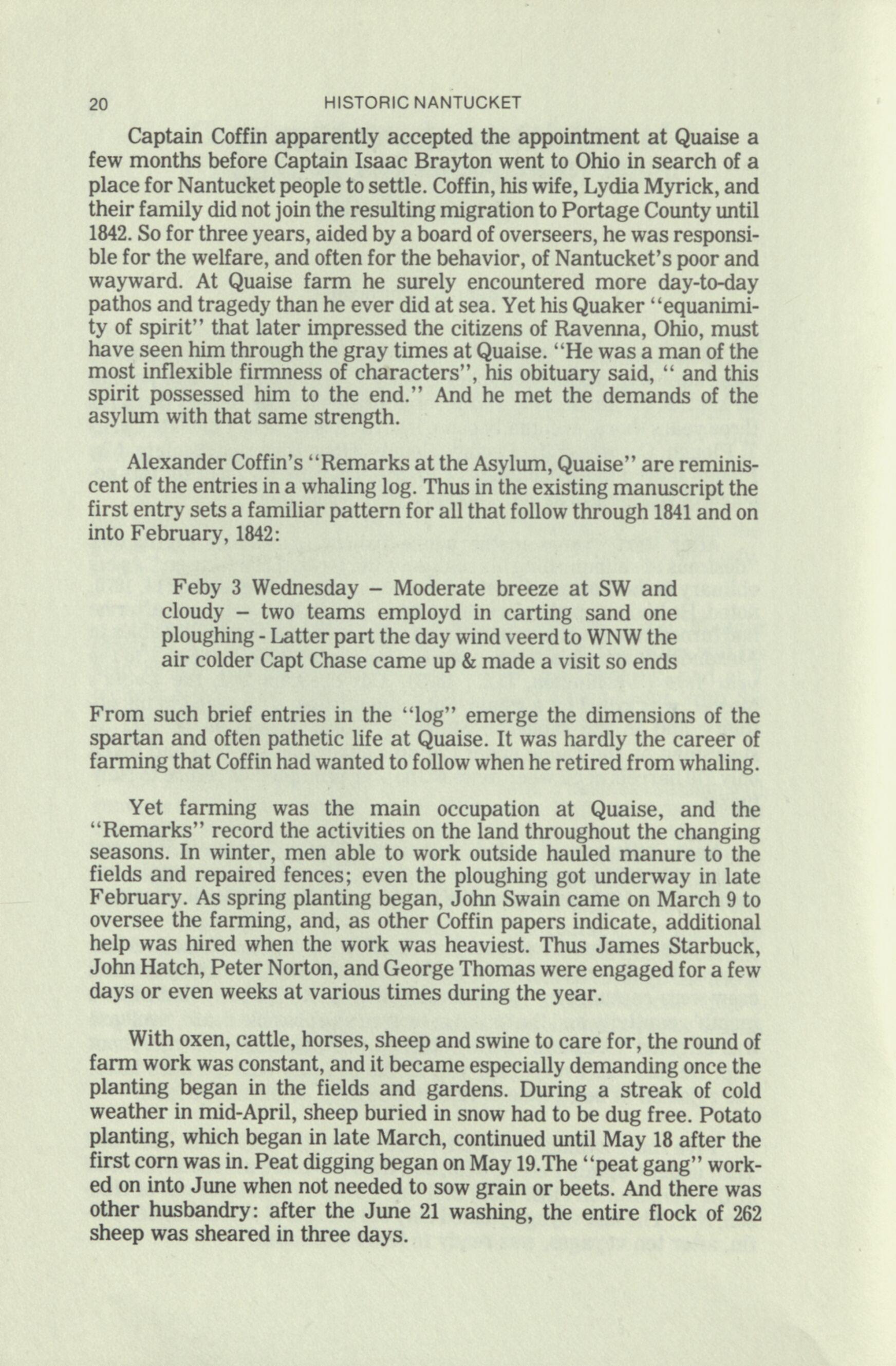
Yet farming was the main occupation at Quaise, and the "Remarks" record the activities on the land throughout the changing seasons. In winter, men able to work outside hauled manure to the fields and repaired fences; even the ploughing got underway in late February. As spring planting began, John Swain came on March 9 to oversee the farming, and, as other Coffin papers indicate, additional help was hired when the work was heaviest. Thus James Starbuck, John Hatch, Peter Norton, and George Thomas were engaged for a few days or even weeks at various times during the year.
With oxen, cattle, horses, sheep and swine to care for, the round of farm work was constant, and it became especially demanding once the planting began in the fields and gardens. During a streak of cold weather in mid-April, sheep buried in snow had to be dug free. Potato planting, which began in late March, continued until May 18 after the first corn was in. Peat digging began on May 19.The "peat gang" worked on into June when not needed to sow grain or beets. And there was other husbandry: after the June 21 washing, the entire flock of 262 sheep was sheared in three days.
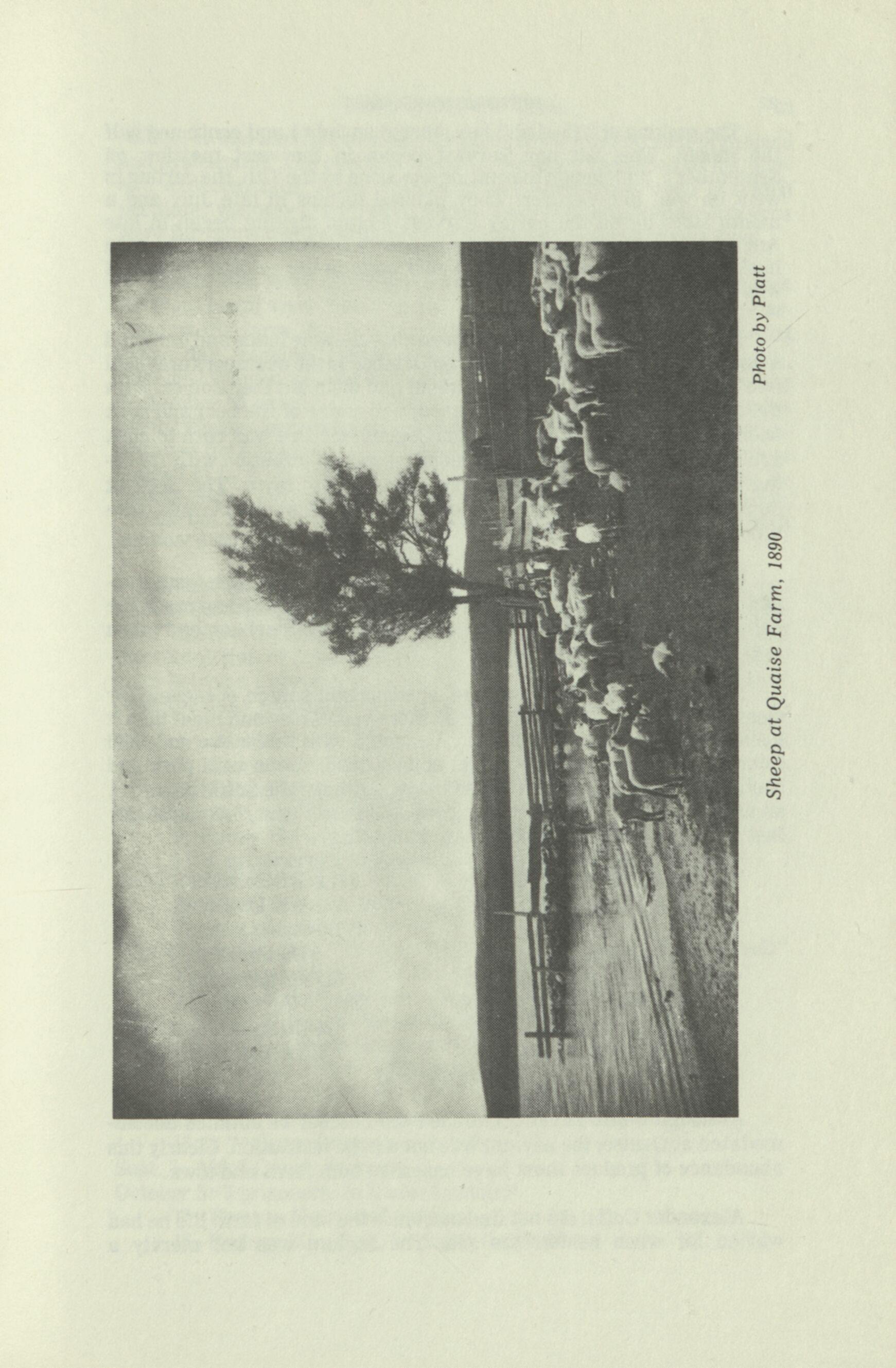
22 HISTORIC NANTUCKET
The making of "English" hay started on July 1 and continued half the month. The salt hay harvest began in the west meadow on September 5, and though the cutting was done by the 27th, the carting in went on well into October. They planted turnips in late July and a month later began the barley harvest. Potato digging began in late August and continued at intervals until late October. Next came corn husking and the storing of turnips and beets in the cellars. By then it was early November.
A strong gale on October 4 toppled considerable fence and unroofed a peat house. Anticipating winter, on October 19 the overseers provided five new stoves which they brought out and installed themselves. With the colder weather, butchering began, with some of the beef and pork being sold in town. And on through December there was corn to husk and barley to thresh. The sheep required special attention with 170 being moved in late November from shear pen to farm. The flock at Squam was rounded up and 18 sheep moved to Quaise; eight rams were taken off Caskato.
On November 13, apparently as production declined, the farm stopped "running milk" to town. In the spring Edward Pease had made the daily trip with 33 to 38 quarts. In late June James Starbuck had taken over the delivery.
Such trade with the town was an important source of income for Quaise farm which clearly produced more vegetables and meat than it needed to augment a diet heavily ballasted with molasses, cod, and flour, all purchased by the barrel or hogshead. Along with pork and beef, surplus crops were marketed in town. Among the Coffin papers is an undated "List of Vegetations Grown - Quaise Farm," which shows that in one season the workers there harvested
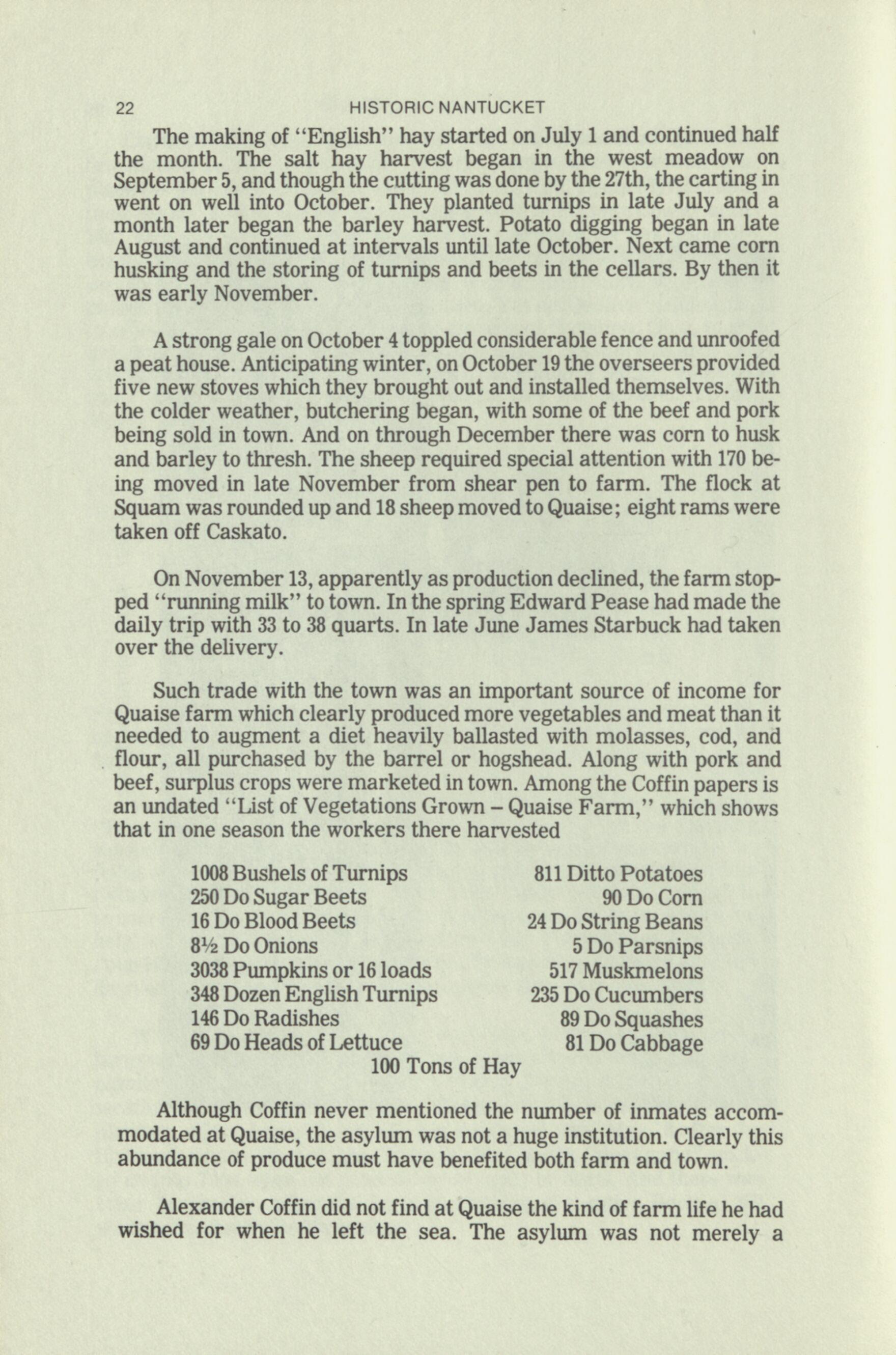
1008 Bushels of Turnips 250 Do Sugar Beets 16 Do Blood Beets 8V2 Do Onions 3038 Pumpkins or 16 loads 348 Dozen English Turnips 146 Do Radishes 69 Do Heads of Lettuce 811 Ditto Potatoes 90 Do Corn 24 Do String Beans 5 Do Parsnips 517 Muskmelons 235 Do Cucumbers 89 Do Squashes 81 Do Cabbage
100 Tons of Hay
Although Coffin never mentioned the number of inmates accommodated at Quaise, the asylum was not a huge institution. Clearly this abundance of produce must have benefited both farm and town.
Alexander Coffin did not find at Quaise the kind of farm life he had wished for when he left the sea. The asylum was not merely a
Alexander Coffin at Quaise
23
refuge; it was also intended to be a place of correction, well-organized and systematic. The overseers, whom he never identified in his journal, expected him to see that care and supervision were provided destitute, wayward, and often ailing people. These human concerns were far more demanding than the management of the farm itself.
Those who were able-bodied (including prisoners sometimes sent out from town) were "sentenced" to "House Industry" when they arrived at the farm. Except for some respite on Sunday, they worked every day, picking oakum when other tasks were not available. (Oakum they produced in quantity: one shipment to town on September 20 amounted to 1300 lbs.) Those in need of discipline were put in "House Correction." And those who were insubordinate were imprisoned for a few days in the farm's jail. Thus on April 3, Coffin was obliged to lock up A.M. Hayden for "refusing to obey orders and Insolents (sic)." On July 11, Benjamin Lewis, in the cell for disobedience "broke out..& run to town." Coffin sent for him, but noted later, "have not heard anything of him."
An undated document in Coffin's hand writing indicates that at ona time 17 persons were in "Housing Industry" and 8 in "House Correction." But the number always varied with admissions, dismissals, and the completion of stipulated periods of service. The record of admissions between February 3,1841 and February 15,1842 can be extracted from the daily entries in the journal: February 4: Alex Hall, pauper 7: Louisa P. Bowen, pauper, sick 18: Robert Holmes, pauper March 4: A.M. Hayden "brought up" 9: Henry Fisher, pauper 11: 5 prisoners (1 to House Industry, 4 to House Correction) April 15: Henry Coleman & wife, to House Industry, 6 mo. 21: Elsey Spencer, to House Industry 29: "3 children named Spencer" May 2: Avis Simpson, "brought up" "run from C. Burgess put in cell" 15: Deborah Marden, to House Industry, 6 mo. 20: John Naboth, pauper; Wm. Allen, to House Industry June 1: Henry Wilson, to House Industry, 60 days July 2: Nancy Green, to House Industry 10: Lucretia Folger, to House Industry 16: Eliza Morrison (and infant), pauper August 6: E.H. Ca/r/ter, pauper 13: a "coloured man in a stupid state" Sept. 3: Abial Davis, pauper October 5: 3 prisoners, to House Industry 12: Thomas Townsend, pauper 16: Rodney Mumford, to House Correction
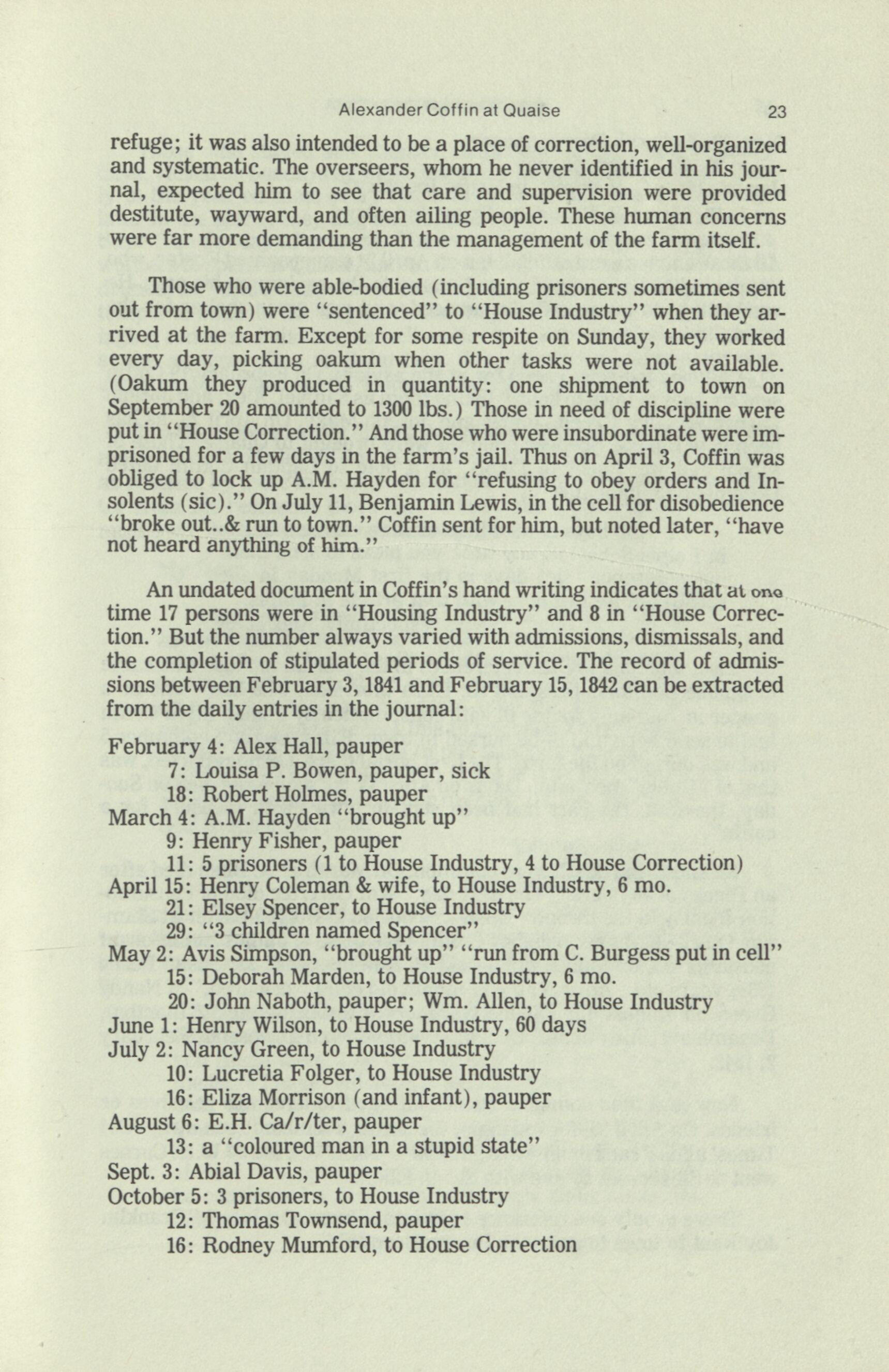
24
HISTORIC NANTUCKET
Nov. 23: Deborah Perry, pauper 28: F. Calder, pauper Jan., 4. 1842: C. Brockett, to House Industry 16: Henry S. Boston, to House Industry
All those entries were official, but on April 24 a man named Foster, who "appeared to be in stupid state", came to the asylum on his own. He wouldn't go to town as Coffin advised, and was given shelter for the night.
Children too were cared for at the asylum. On February 19 Coffin sent six boys to town to board, listing them as Samuel, Alex, and Joseph Carpenter, Alex Green, James and Joseph Maxy. On April 29, as has been noted, three Spencer children were brought to Quaise. Those of school age were sent to Polpis, as a note to Captain Coffin, dated December 13, indicates: Sir, the boys named in your note can be admitted in Polpis School at any time you pleas to send them our enterence (sic) days is the first Monday in each month but we dispense with that article in Polpis. Yours respectfully, Alex Macy.
Most touching are the references in the journal to those who came to Quaise both penniless and ill. Eliza Morrison, who had come as a pauper in mid-July was so ill with consumption by August 1 that Coffin had to send her child to be nursed in town. Eliza died on September 5 and was buried on the farm. The first burial there, Coffin reported, was that of "Uncle" Benjamin Davis on April 14. As soon as he died on Sunday, the 18th, the cart had been sent to town "with measure for a coffin".
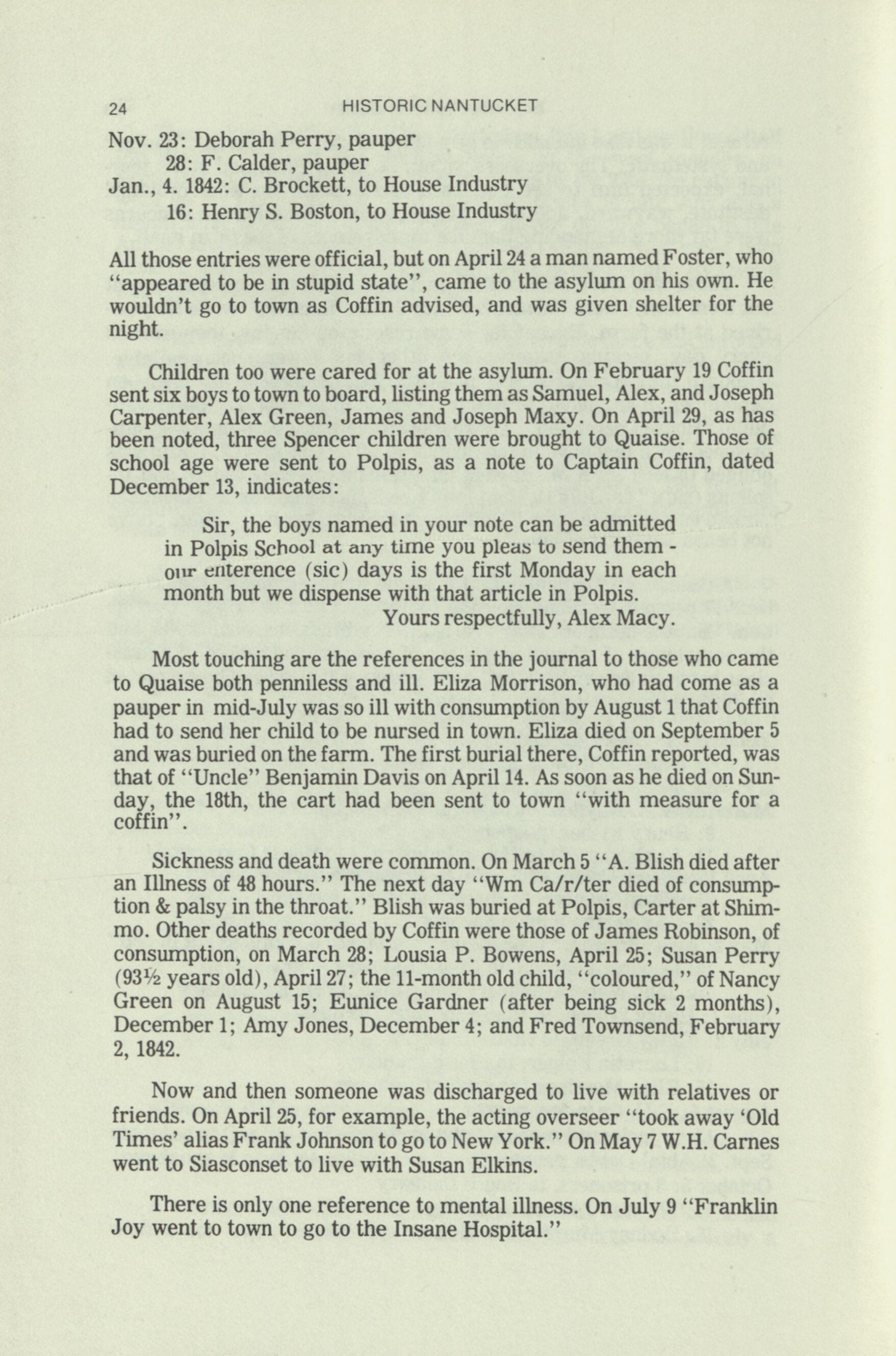
Sickness and death were common. On March 5 "A. Blish died after an Illness of 48 hours." The next day "Wm Ca/r/ter died of consumption & palsy in the throat." Blish was buried at Polpis, Carter at Shimmo. Other deaths recorded by Coffin were those of James Robinson, of consumption, on March 28; Lousia P. Bowens, April 25; Susan Perry (93% years old), April 27; the 11-month old child, "coloured," of Nancy Green on August 15; Eunice Gardner (after being sick 2 months), December 1; Amy Jones, December 4; and Fred Townsend, February 2, 1842.
Now and then someone was discharged to live with relatives or friends. On April 25, for example, the acting overseer "took away 'Old Times' alias Frank Johnson to go to New York." On May 7 W.H. Carnes went to Siasconset to live with Susan Elkins.
There is only one reference to mental illness. On July 9 "Franklin Joy went to town to go to the Insane Hospital."
Alexander Coffin at Quaise
25
Those who stayed and endured must have spent quiet, ordinary days, varied on Sundays by walks about the farm in good weather. Early in the year on most every Sabbath some of the men went eeling; later in the spring they dug clams, and in the summer they fished on these free Sunday afternoons. The overseers encouraged temperance workers to speak at Quaise, and on October 31 "a company of reformed drunkards" held a temperance meeting there, but one of many such attempts to educate the wayward. Carriages often came from town bringing concerned visitors, as well as the overseers who frequently met at the asylum, often on Saturdays. The county commissioners also came on July 9 to inspect "House Industry" and "House Correction."
But these were hardly diversions. Surely life at Quaise asylum was mostly a time of waiting and acceptance, made as orderly and secure as possible by those in charge. Alexander Coffin saved an undated letter from his residence there that reveals the quiet endurance which must have been a common attitude at the asylum: My Dear
I thought I would not detain you to come to me I had no word in the afternoon and I thought I would trie (sic) and see if I could quilt a Holder as I once did but I found I come (sic) short but my Dear I have quilted many a silk one very handsom (sic) but that day is past I want you to accept this to see what I have done by this hang it up by you to put pins and Needles on when you set by the fier (sic) in the Winter if you live which God grant you may for my sake if it is the will of God to spair (sic) me.
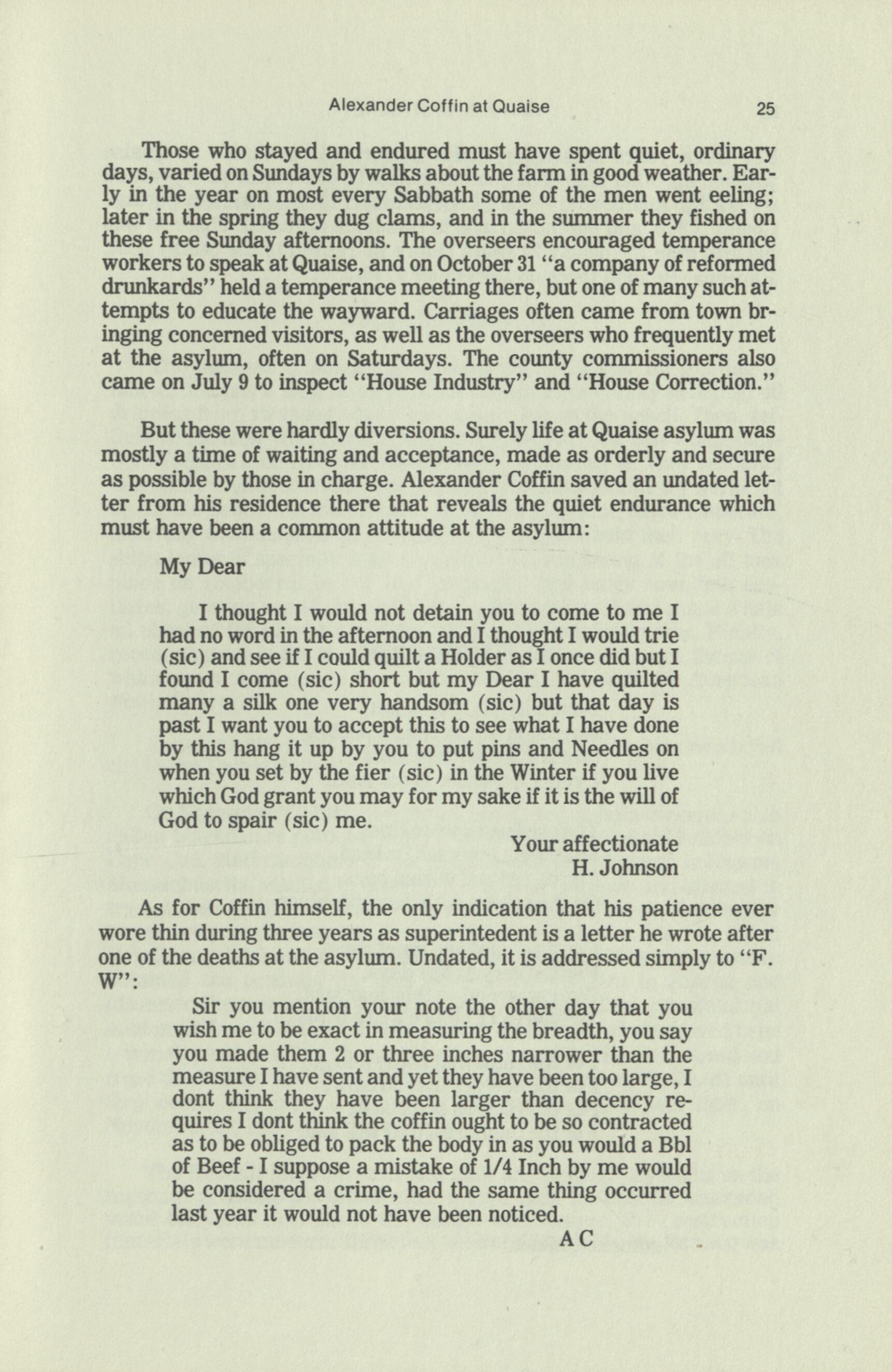
Your affectionate H.Johnson
As for Coffin himself, the only indication that his patience ever wore thin during three years as superintedent is a letter he wrote after one of the deaths at the asylum. Undated, it is addressed simply to "F. W":
Sir you mention your note the other day that you wish me to be exact in measuring the breadth, you say you made them 2 or three inches narrower than the measure I have sent and yet they have been too large, I dont think they have been larger than decency requires I dont think the coffin ought to be so contracted as to be obliged to pack the body in as you would a Bbl of Beef -1 suppose a mistake of 1/4 Inch by me would be considered a crime, had the same thing occurred last year it would not have been noticed. AC








